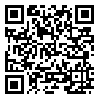Mon, Feb 23, 2026
| فارسی
Volume 27, Issue 1 (Spring 2021)
IJPCP 2021, 27(1): 2-15 |
Back to browse issues page
Download citation:
BibTeX | RIS | EndNote | Medlars | ProCite | Reference Manager | RefWorks
Send citation to:



BibTeX | RIS | EndNote | Medlars | ProCite | Reference Manager | RefWorks
Send citation to:
Asmari Bardezard Y, Khanjani S, Mousavi Asl E, Dolatshahi B. Effect of Emotion-focused Therapy on Anxiety, Depression and Difficulty in Emotion Regulation in Women With Binge Eating Disorder. IJPCP 2021; 27 (1) :2-15
URL: http://ijpcp.iums.ac.ir/article-1-3119-en.html
URL: http://ijpcp.iums.ac.ir/article-1-3119-en.html
1- Department of Clinical Psychology, University of Social Welfare and Rehabilitation Sciences, Tehran, Iran.
2- Department of Clinical Psychology, School of Behavioral Sciences and Mental Health (Tehran Institute of Psychiatry), Iran University of Medical Sciences, Tehran, Iran.
3- Department of Psychiatry, Golestan Hospital, School of Medicine, Ahvaz Jundishapur University of Medical Sciences, Ahvaz, Iran.
4- Department of Clinical Psychology, University of Social Welfare and Rehabilitation Sciences, Tehran, Iran. ,dolatshahee@yahoo.com
2- Department of Clinical Psychology, School of Behavioral Sciences and Mental Health (Tehran Institute of Psychiatry), Iran University of Medical Sciences, Tehran, Iran.
3- Department of Psychiatry, Golestan Hospital, School of Medicine, Ahvaz Jundishapur University of Medical Sciences, Ahvaz, Iran.
4- Department of Clinical Psychology, University of Social Welfare and Rehabilitation Sciences, Tehran, Iran. ,
Abstract: (6415 Views)
Objectives: This study aims to investigate the effect of Emotion-Focused Therapy (EFT) on depression, anxiety, and Difficulty in Emotion Regulation (DER) in women with Binge Eating Disorder (BED).
Methods: This is a quasi-experimental study with pre-test/post-test/follow-up design using a control group. Study population consists of all women referred to the obesity clinics in Tehran in 2019. Of these, 40 were selected using a purposive sampling method and were randomly divided into two groups of intervention (n=20) and control (n=20). The intervention group received 10 sessions of EFT, each session for 90 minutes. Data collection tools were the Beck Anxiety Inventory (BAI), the Beck Depression Inventory II (BDI-II), Difficulties in Emotion Regulation Scale (DERS), and Binge Eating Scale (BES), which were completed before and after the intervention. Data were analyzed using descriptive statistics and repeated measure ANIVA in SPSS v. 21 software.
Results: Group EFT significantly reduced the mean anxiety, depression, DER and severity of binge eating after intervention and over the 2-month follow-up period in BED women (P<0.05).
Conclusion: The EFT can reduce anxiety, depression, DER and binge eating severity in BED women, and its effect remains constant after two months. It can be useful in the treatment of BED.
Methods: This is a quasi-experimental study with pre-test/post-test/follow-up design using a control group. Study population consists of all women referred to the obesity clinics in Tehran in 2019. Of these, 40 were selected using a purposive sampling method and were randomly divided into two groups of intervention (n=20) and control (n=20). The intervention group received 10 sessions of EFT, each session for 90 minutes. Data collection tools were the Beck Anxiety Inventory (BAI), the Beck Depression Inventory II (BDI-II), Difficulties in Emotion Regulation Scale (DERS), and Binge Eating Scale (BES), which were completed before and after the intervention. Data were analyzed using descriptive statistics and repeated measure ANIVA in SPSS v. 21 software.
Results: Group EFT significantly reduced the mean anxiety, depression, DER and severity of binge eating after intervention and over the 2-month follow-up period in BED women (P<0.05).
Conclusion: The EFT can reduce anxiety, depression, DER and binge eating severity in BED women, and its effect remains constant after two months. It can be useful in the treatment of BED.
Type of Study: Original Research |
Subject:
Psychiatry and Psychology
Received: 2019/10/28 | Accepted: 2020/08/10 | Published: 2021/04/20
Received: 2019/10/28 | Accepted: 2020/08/10 | Published: 2021/04/20
| Rights and permissions | |
 |
This work is licensed under a Creative Commons Attribution-NonCommercial 4.0 International License. |






